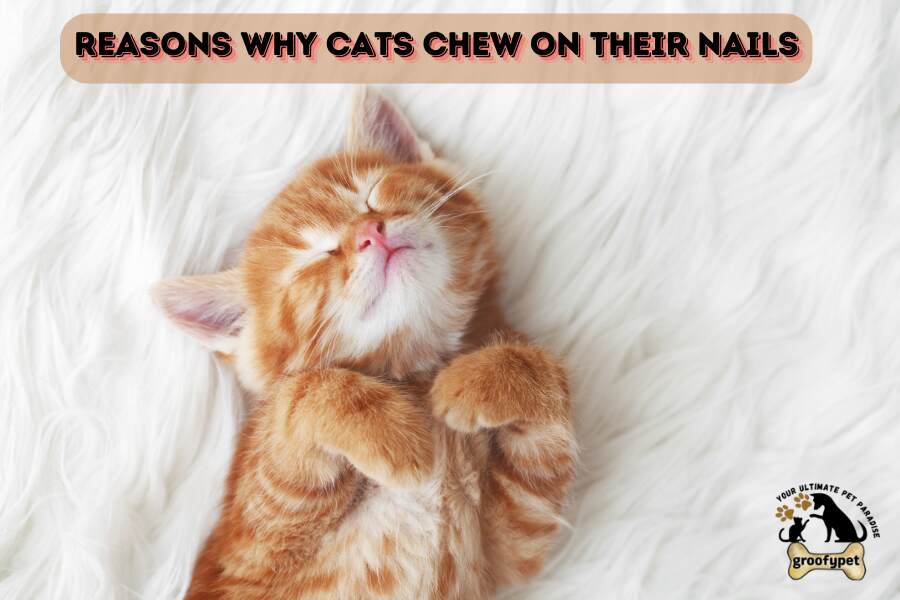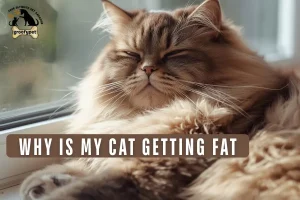
As a cat owner, you might notice your cat engaging in nail-biting behavior. While this can be a normal part of grooming, it’s essential to be aware of the underlying causes and behavioral aspects. Cats often chew their nails to keep them neat and clean.
This process is similar to how they lick their feet and pulling at their claws. Sometimes, though, excessive nail-biting can indicate issues.Understanding the meaning behind this behavior is crucial. In extreme situations, chewing can be a sign of underlying medical or behavioral problems.
For instance, a cat might chew its nails due to broken teeth or unhygienic conditions. If your cat’s behavior seems excessive or harmful, it might be time to consult a vet to help identify if there’s a medical reason.
Table of Contents
ToggleWhy Do Cats Chew on Their Nails?
Excessive nail biting in cats can lead to broken nails, cut skin, or infections. Regular checks are important to ensure their well-being.
Some cats may develop this habit due to stress or other behavioral issues. Just like humans who have bad habits like biting their nails, cats can also act out in different ways when they are stressed. Being concerned about your cat’s nail-biting is natural, but with the right information and understanding, you can address these issues effectively.
What Makes Up Cat Nails?
Cats often bite their nails because they are made of keratin, a protein also found in hair and skin. Unlike fingernails, cat nails have a quick inside, with blood vessels and nerves that provide a supply of nutrients.
Cat claws grow in layers, with newer sharper layers forming underneath the oldest outer layers, which are shed regularly. This renewing cycle happens every few weeks, keeping their claws in top condition continuously throughout their life. The rate of this complete process is crucial for regular maintenance, as claw husks are discarded.
In a household setting, especially for indoor cats, maintaining working condition of claws is still important. Cats need to hunt, climb, balance, and defend themselves, so keeping their claws sharp is essential.
How to stop your cat from chewing his nails?
If your cat is clearly chewing its nails more than occasionally, it might be time to examine the paws for any issues. Excessive nail chewing can lead to broken nails, cut skin, or even an infection. My own cat started chewing his nails and paws obsessively, and we discovered he had a yeast infection causing itchy nails.It’s important to keep an eye out for any injury or infections, as this behavior can be hard to miss but might indicate something more serious, like an itchy infection or other paw issues. Regular checks can help ensure your cat stays happy and healthy.
Reasons why does my cat chew his nails?

1. Normal Grooming Behavior
Cats often chew their nails as part of daily grooming. This helps them clean their paws and remove dirt. It is a natural habit and usually not harmful. Most cats do this after resting or eating. If there is no pain or damage it is normal behavior.
2. Removing Old Nail Layers
Cat nails grow in layers over time. Chewing helps remove the dead outer layer. This keeps the nails sharp and smooth. You may notice small claw pieces on the floor. This is a healthy process for cats.
3. Overgrown Nails
Indoor cats may not wear down their nails enough. Long nails can feel uncomfortable. Chewing helps shorten them naturally. Regular nail trimming can reduce this habit.
4. Stress or Anxiety
Cats chew their nails when they feel stressed. Changes at home can upset them. New pets visitors or loud sounds can be triggers. Chewing helps them feel calm and safe.
5. Boredom or Lack of Play
Cats need daily play and mental activity. A bored cat may chew nails to pass time. This is common in cats left alone for long hours. Toys and playtime help a lot.
6. Allergies or Skin Irritation
Itchy paws make cats chew their nails. Food allergies or litter dust can cause irritation. You may see redness or frequent licking. Changing diet or litter may help.
7. Pain or Nail Injury
A broken or cracked nail hurts. Cats chew to relieve pain. Always check the paw for swelling or blood. A vet should check serious injuries.
8. Dental Problems
Mouth pain can lead to strange chewing habits. Cats may chew nails due to dental discomfort. Bad breath or trouble eating are warning signs. Dental care is important.
9. Parasites
Fleas or mites can irritate the paws. This makes cats bite and chew their nails. Regular parasite prevention keeps this under control. Check the skin often.
10.Nail Infections
Bacterial or fungal infections cause pain and itching. Chewing helps cats soothe the area. Nails may look swollen or discolored. A vet visit is needed for treatment.
Normal Grooming Routine for cats
Cats are known to constantly groom themselves to stay clean. If you’re asking is it normal for cats to bite their nail it’s usually a normal part of their routine for taking care of themselves. Biting nails helps remove broken pieces of claw or dirt and debris from around their toes.
This act isn’t just about cleanliness; it also ensures their nails remain sharp and in tip-top condition.Cats use their teeth to clean each part of their nails, maintaining high standards of hygiene. Think of it like how we might file our nails to keep them neat.
This behavior is essential for them to keep their natural weapons in tip-top condition, ensuring they can defend themselves and their territory if needed. Therefore, a bit of nail chewing is just your feline’s way of staying on top of their grooming game.
Signs That Need Attention
If you notice your cat constantly pulling and biting his nails, it might be trying to tell you something. It’s important to examine your cat’s paws for any signs of health issues. Look for redness, swelling, hair loss, rough or cracked skin, and even bleeding.
These can indicate underlying problems that need attention. As a pet owner, keeping an eye on these details can help ensure your furry friend stays healthy and comfortable.
- Older cats may chew their nails excessively due to various health conditions.
- Ringworm or other fungal infections can cause redness and inflammation in the skin and fur, leading to nail chewing.
- Bacterial and yeast infections in the nail beds can make nails swollen and thick.
- Pemphigus, an autoimmune disease, affects nail beds causing aggressive chewing.
- My cat once had a fungal infection causing redness and bite his nails a lot until treated.
Behavioral issues cause excessive nail chewing
- When cats start to bite their nails excessively, it could be due to behavioral issues like anxiety, boredom, or stress.
- Regular grooming is a simple habit for them, but when it turns into overgrooming, it becomes an issue.
- Cats are sensitive creatures and a sudden change in their routine such as moving to a new house or even just rearranging their food bowls can make them anxious and stressed.
- They might feel lonely or frustrated and want more affection, playtime, and engaging toys.
I noticed my cat started pulling at his nails when we got a new bed or a tree, which was just a sign of overgrooming from boredom. Providing more playtime and affection can help calm them and solve this problem.
Helping Your Cat with Nail Health
Cats often bite their nails as part of their grooming routine to remove old layers and keep their claws healthy, but if you notice overgrown nails or if your cat seems concerned or irritated, there might be underlying health issues.
It’s important to watch for signs of problems like nails getting stuck in fabric or carpeting, which could lead to injuries. Scratching posts at home can reduce nail chewing by providing a place to shed old layers and keep claws trimmed.
To prevent overgrowing nails and make walking less difficult or painfully, regular trimming is essential. I use the Hepper Nail Clipper Set with stainless steel clippers, ergonomic handles, and safety guards which are perfect for cats of all ages and breeds.
Keeping claws at a healthy length helps avoid sharp tips that can injure paw pads or get stuck in carpeting. If you’re concerned about your cat’s grooming behaviors, consult a veterinarian to diagnose and treat any issues.
How to Manage Nail Biting and Chewing in Cats?
My cat occasionally chews his nails, and I’ve discovered that this behavior is quite normal. However, if the chewing becomes more pronounced, it’s important to examine his paws for any signs of irritation, injuries, or infection. When my cat seemed uncomfortable, I took him to the vet to find the root of the problem.
The vet explained that stress, anxiety, or boredom could be the cause. To help my cat feel more relaxed and comfortable, I started daily play sessions and exercise routines. This approach not only resolves the nail-biting but also makes my cat less inclined to scratch furniture.
To manage your cat nail biting and chewing, follow these steps: Examine the paws for any injury or infection and treat as necessary. If the issue seems to be related to stress or anxiety, try to keep your cat relaxed with regular play and exercise sessions.
If the behavior persists, it might be challenging to handle alone, so consider consulting a vet to intervene and address the problem effectively.
Keeping Your Cat’s Nails Healthy
Cats often bite heir nails as a normal part of their grooming. It’s a telltale sign that your kitty is maintaining nail health. Chewing helps remove old layers of the nail that curve and can be uncomfortable. It’s important for pet owners to regularly check their cat’s paws and feet for any issues.
Providing scratching posts and toys is highly recommended to keep their nails in shape and prevent furniture damage. If you’re a first-time cat owner, learning to handle trimming can be a bit of a chore. Start slowly, using clippers designed for cats and follow a good guide.
If uncertain, ask a vet for a demonstration. Making sure posts and toys are accessible helps in maintaining their health.
Pemphigus: A Rare Autoimmune Skin Disease in Cats
When my cat started to chew his nails excessively, I noticed he also scratched and licked his body more than usual. After a visit to the vet, I learned about Pemphigus Foliaceous, a rare autoimmune skin disease in cats.
This condition causes crusty and flaky lesions on the nail beds and other parts of the body. These lesions are often itchy and irritating, leading cats to chew, scratch, and lick the affected areas to relieve discomfort. It’s crucial to keep the area clean to prevent further infection and help soothe their sore claws.
Ringworm: Handling the Issue
As a cat owner, I’ve noticed my feline friend sometimes chewing his nails, and I wondered why this happens. Excessive grooming can be a sign of anxiety or affected nail beds. Another reason could be ringworm, a fungal infection that can cause skin lesions.
Ringworm is a zoonosis that can be transmitted from cats to humans. If you notice your cat’s nail beds affected or any suspicious skin lesions, it’s essential to be cautious. Frequent touching or handling your cat with bare hands can increase the risk of infection. If you suspect ringworm, consult a doctor right away to prevent it from spreading to humans.
Nail Bed Infections in Cats
I’ve noticed that cats can sometimes bite their nails excessively. One of the reasons for this behavior could be nail bed infections. These infections can manifest with swelling around the nail bed, and you might also see sticky discharge.
It can be quite painful for your cat, and as a result, they start chewing their nails to try and relieve the discomfort. I’ve had another cat who went through this, and after a visit to the vet, we found that treating the skin infection helped stop the excessive chewing. It’s important to develop a keen eye for these symptoms to ensure your furry friend stays healthy.
Thick Brittle Nails in Older Cats
Cats often chew their nails to remove old, brittle pieces that flake away. This behavior helps keep their claws thick and healthy. Due to age or a hormonal imbalance, older cats can develop flaky nails more often, which can make owners worry.
Usually, this is a natural grooming attempt to maintain claw health. From my experience, my cat’s nail chewing is just part of his routine and not a cause for concern.
Should You Trim Your Cat’s Nails Regularly?
One question that often arises is whether you should be cutting your cat’s nails. Based on my experience, it’s a good idea to do so. Regular trims can prevent the nails from curling into the paw pads and causing pain.
Plus, it helps avoid their claws catching on carpets or furniture. If your cat goes outdoors, keeping their nails trimmed is still important, but they also need some length to defend themselves against predators.Using scratching posts can help naturally wear down their nails.
However, for indoor cats, regular grooming is key. If you’re ever unsure about how to trim their nails properly, a veterinarian can show you the best techniques. It’s a simple way to keep your furry friend comfortable and your home safe from accidental scratches or damage.
Why Does My Cat Chew His Back Nails?
Cats often chew their back nails during grooming. Back nails grow fast and collect dirt easily. Chewing helps remove dead nail layers. It also keeps the claws comfortable. This is usually normal unless there is pain or bleeding.
Why Does My Cat Chew on His Toenails?
Toenail chewing helps cats clean their paws. Cats use their mouths to reach small areas. This behavior keeps nails smooth and healthy. It is common in indoor cats. Occasional chewing is normal.
Why Is My Cat Always Biting His Nails?
Frequent nail biting can signal stress or boredom. Cats bite nails to calm themselves. Lack of play can increase this habit. Anxiety from changes at home can also cause it. If it happens all day a vet check is helpful.
Is It Normal for My Cat to Bite Her Nails?
Yes it is normal in many cases. Nail biting is part of grooming behavior. Cats remove loose nail layers this way. As long as nails look healthy there is no concern. Problems start only if nails bleed or crack.
Why Do Cats Chew on Their Toenails?
Cats chew toenails to manage nail growth. Claws grow in layers and need upkeep. Chewing removes sharp edges. It also helps with comfort while walking. This is a natural instinct.
Do Cats Chew Their Nails?
Yes most cats chew their nails sometimes. It is common in kittens and adults. This behavior supports nail health. Not all cats do it often. Every cat has different habits.
Why Does My Cat Chew on My Fingers?
Finger chewing is often playful behavior. Cats explore using their mouth. It can also mean affection or attention seeking. Some cats do this while relaxed. If it hurts redirect with a toy.
Cat Biting Her Nails
Female cats bite their nails just like males. It is not linked to gender. Grooming and comfort are the main reasons. Stress or itchiness can increase it. Watch for signs of pain.
Why Is My Cat Chewing on His Nails?
Chewing helps cats feel comfortable. It can be grooming boredom or mild stress. Allergies can also cause itchy paws. Regular play reduces this behavior. Healthy cats still chew sometimes.
Why Is My Cat Biting His Nails Off?
Biting nails off can happen when nails overgrow. Cats may also do this if a nail hurts. Cracked nails cause discomfort. Always check the paw closely. Seek vet care if nails break often.
Why Do Cats Eat Their Nails?
Cats sometimes swallow nail pieces while grooming. This happens accidentally. Nail layers come off easily. It is usually harmless. It helps keep the mouth clean too.
Why Do Cats Press Soft Things?
Cats press soft things due to a behavior called kneading. This starts in kittenhood while nursing. It brings comfort and safety feelings. Adult cats do this when relaxed. It shows happiness and trust.
Frequently Asked Questions
Why Do Cats Chew on Their Toes?
Cats often bite their claws as a normal part of their self-grooming routine. Using their paws, they remove stuck-on debris like bits of litter from their feet. However, excessive foot biting can indicate physical or mental distress, causing discomfort. From my experience, it’s important to watch this behavior to see if it’s just part of their grooming or something more serious.
Why does my cat nibble on his toe nails?
Cats often engage in self-grooming to maintain their cleanliness and overall health. When your cat starts nail biting, it might be part of their regular grooming routine. However, sometimes this behavior can be a bit sneaky, hiding underlying issues like infections or injuries.
How to Prevent Your Cat from Chewing on Your Toes?
When your cat starts attacking your feet or hands, it’s important to address the behavior immediately. Gently say “no” and set the cat aside or pick them up and place them in a different room for a time-out. Repeat this process each time they chew on your toes, ensuring they learn without any harshness.
Final Thoughts
If your cat is chewing his nails, it’s important to consider potential causes such as stress, boredom, or underlying medical issues like infections or allergies. Observing your cat’s behavior and consulting with a veterinarian can help identify and address the root cause.
Providing engaging activities, proper grooming, and regular health checks can significantly improve your cat’s well-being. Understanding and addressing this behavior ensures your cat remains happy and healthy, preventing further complications and promoting a better quality of life.
Is it Normal for Cats to Bite their Nails?Explore Amazing Answers!



